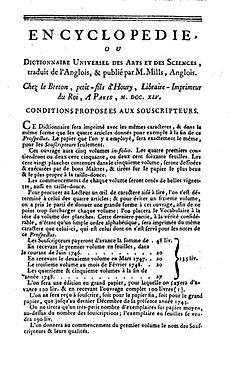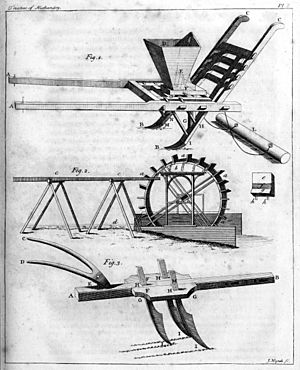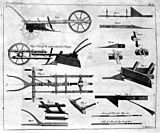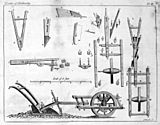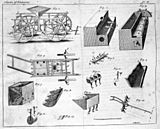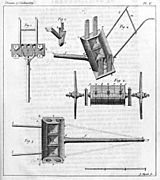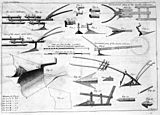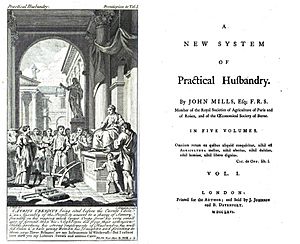John Mills (encyclopedist) facts for kids
John Mills (born around 1717 – died around 1794) was an English writer, translator, and editor. He is famous for being one of the first people to plan a French version of Ephraim Chambers's Cyclopaedia in 1745. This project later led to the very famous Encyclopédie published in France.
As a writer, John Mills focused on agriculture, which is the science of farming. He is known for writing one of the first complete books about all parts of farming. His main work, A New System of Practical Husbandry, came out in 1767 in five volumes. It brought together ideas from many other farming experts. Mills strongly believed in the importance of small farms.
Contents
A Look at His Life
John Mills was an important person in the 1700s, but we don't know many details about his life. He might have lived in other countries, like France, for a long time. In 1741, he was in London and planned to go to Jamaica. But he changed his mind because he found "something more advantageous" in England. Mills married a French woman, and they had two children.
In 1743, Mills was in Paris. He worked with Gottfried Sellius, a German historian, to create a French version of Chambers's Cyclopaedia. They called their project Encyclopédie. However, the printer, André le Breton, tricked Mills. Le Breton took the money from people who subscribed and even attacked Mills. Le Breton then got the rights to publish the book in his own name. This event was the start of the famous Encyclopédie that was published later. Mills couldn't get justice, so he went back to England.
In the 1760s, Mills found his true calling: writing about agriculture. He started by translating a book on farming by Henri-Louis Duhamel du Monceau in 1762. In 1766, he published An Essay on the Management of Bees. His big book, A New System of Practical Husbandry, (1767) covered all areas of farming. It was the first time potatoes grown in fields were mentioned in such a book. He also wrote about the weather and cattle.
On February 13, 1766, Mills became a Fellow of the Royal Society. Benjamin Franklin was one of the people who supported his election. Mills was also the first foreign member of the French Agricultural Society. He was part of other important societies in Rouen, Mannheim, and Bern.
His Important Works
John Mills was known for his deep knowledge of farming and how to grow crops. He wrote and translated many books on these topics. He became a well-known author on husbandry (farming) in the 1760s. He was elected to the Royal Society in 1766. He first became known about 20 years earlier when he worked on the French translation of Chambers's Cyclopaedia.
The Encyclopédie Project
Ephraim Chambers first published his Cyclopaedia, or an Universal Dictionary of Arts and Sciences in London in 1728. It was a popular book, and many new versions came out. In France, John Mills and Gottfried Sellius were the first to plan a French version of Chambers's Cyclopaedia in 1745. They decided to call it Encyclopédie.
In early 1745, Mills and Sellius released a leaflet to get people to subscribe to their project. This leaflet showed that the book would have five volumes. It said the first volume would come out in June 1746. Mills and Sellius translated the text. An unnamed person, who was likely Denis Diderot, checked their work.
Many journals wrote good reviews about the project. They praised it as one of the biggest efforts in literature in a long time. The Mercure Journal even wrote a 25-page article praising Mills. It said he was an English scholar who grew up in France and spoke both French and English perfectly. The journal also said Mills was very excited about the project.
However, the partnership ended later in 1745. André le Breton, the publisher, cheated Mills out of the money. He claimed Mills' French wasn't good enough. Le Breton even attacked Mills. Mills took him to court, but the court sided with Le Breton. Le Breton then replaced Mills with other people, including Denis Diderot. After the court decision, Mills left for England.
A Practical Treatise of Husbandry, 1759
Mills' first important work on farming was translating Duhamel du Monceau's Practical Treatise of Husbandry from French. The full title was very long:
- A practical Treatise of Husbandry: Wherein are contained many useful and valuable Experiments and Observations in the New Husbandry, collected during a Series of Years, by the celebrated, M. Duhamel Du Monceau, Member of the Royal Academy of Sciences dt Paris, Fellow of the Royal Society, London, &c. Also the most approved Practice of the best English Farmers, in the old Method of Husbandry. With Copper-Plates of several new and useful Instruments., 4tO. 16s. Whiston, &c.
Duhamel's original work had five volumes. Mills only translated the parts that he thought were most helpful for farming at the time. Mills wrote in the introduction that Duhamel's work was a great example. It showed many farming experiments done over several years.
Mills believed that Duhamel's work was important because it was based on real-life experience. He said that farming can't just rely on ideas. It needs facts and experiments, just like other sciences. He quoted Francis Home, who said:
- Agriculture does not take its rise originally from reason, but from fact and experience. It is a branch of natural philosophy, and can only be improved from a knowledge of facts, as they happen in nature.
Home also said that Duhamel's experiments were "distinct, exact, conclusive." He thought it was a shame that Great Britain, which cared so much about farming, let foreigners be the ones to do these important experiments.
- Illustrations of A practical Treatise of Husbandry, 1759
A New and Complete System of Practical Husbandry, 1762–1765
John Mills wrote his own major work, A new and complete system of practical husbandry. It came out in five volumes between 1762 and 1765. This was the first book about farming that covered all its different parts in one place.
- Volume 1 talked about different kinds of soil (like clay and sand). It also covered manures, how to improve wet or unused lands, and how to grow grains like wheat, rye, oats, and barley.
- Volume 2 focused on a farming method called "horse-hoeing husbandry" for grains. It also discussed diseases that affect crops.
- Volume 3 looked at things that harm crops. It also covered how to store grains, and how to grow turnips, potatoes, cabbages, and different grasses. It also talked about fencing fields and where to build farmhouses.
- Volume 4 was about gardening and growing hops and olives.
- Volume 5 explained how to make and manage fermented drinks. It also covered plants like hemp, flax, and madder.
Mills' book was very well organized and was considered the best farming book of its time. He included ideas from other famous writers like John Evelyn and Henri-Louis Duhamel du Monceau. He also gave credit to Jethro Tull's farming system. This book was the first to mention potatoes being grown in fields.
Mills strongly supported small farms. He believed they were very important.
Other Books He Wrote
Mills also wrote other useful books:
- "A treatise on cattle" taught people how to breed and care for horses, donkeys, mules, cows, sheep, goats, and pigs. It also gave advice on how to treat their diseases.
- "An essay on the management of bees" showed how to raise bees. It also explained that ancient people knew how to take honey and wax without harming the bees.
- "An essay on the weather" gave tips on understanding weather changes. It also had advice on how to protect lives and buildings from lightning.
His book on cattle was very detailed. It described the different animals and their health problems.
Mills also translated other books. He translated "Duhamel's husbandry" in 1759. In 1770, he translated "Natural and chemical elements of agriculture." He is also thought to have written some essays on moral, philosophical, and political topics.
His Lasting Impact
John Mills was a big supporter of a new farming method called "horse-hoeing husbandry." This idea came from Jethro Tull. Mills helped spread this method in England by translating works from French and Swiss experts. Because of Mills, people like Arthur Young learned about new farming ideas. Mills' main book, A New and Complete System of Practical Husbandry, was even translated into German.
In 1777, a British book called The Complete Farmer: Or, a General Dictionary of Husbandry listed John Mills as one of the most important farming experts of his time.
In the 1800s, Donaldson (1854) said that Mills' Practical Husbandry was the first book to cover all parts of farming in one work. However, many of the "horse-hoeing husbandry" ideas became old-fashioned as farming quickly improved. Still, Mills' Practical Husbandry was used as a reference until the 1820s. Some of his other books are still praised today. For example, The Management of Bees was called "one of the bee books which are worth reading over and over again." His An Essay in the Weather was considered excellent for a very long time.
 | Kyle Baker |
 | Joseph Yoakum |
 | Laura Wheeler Waring |
 | Henry Ossawa Tanner |


